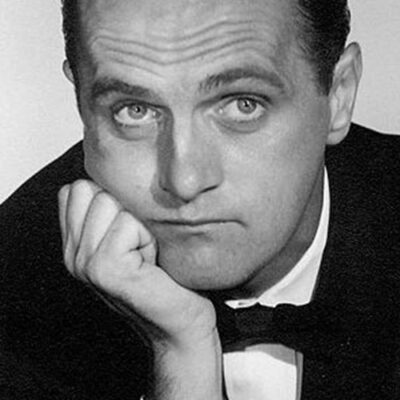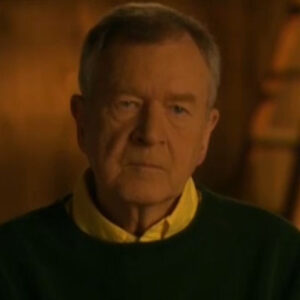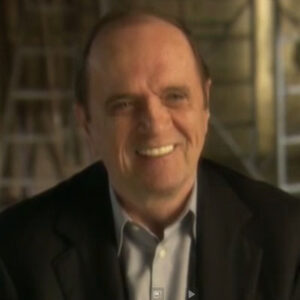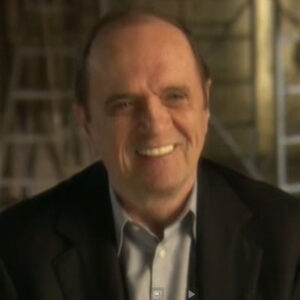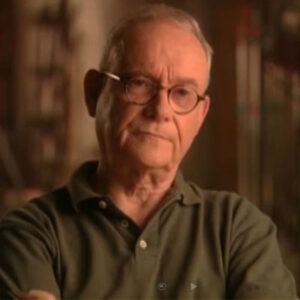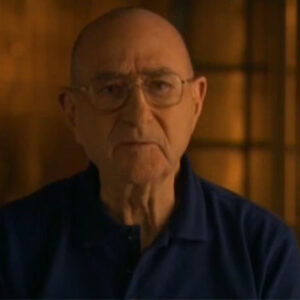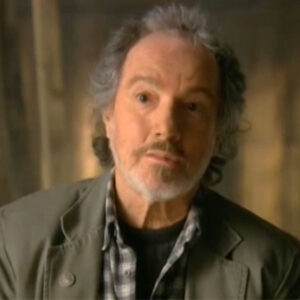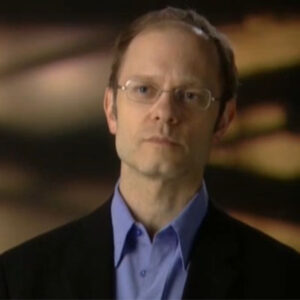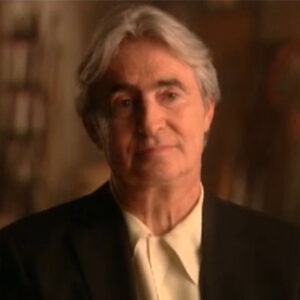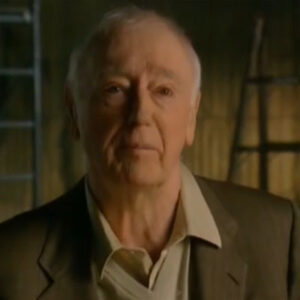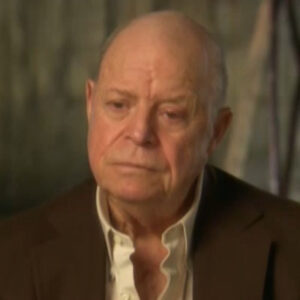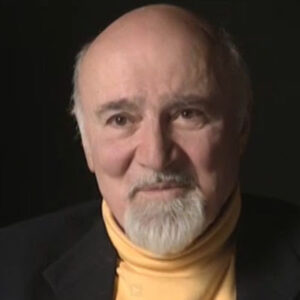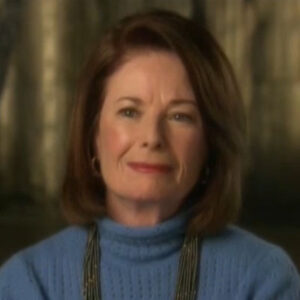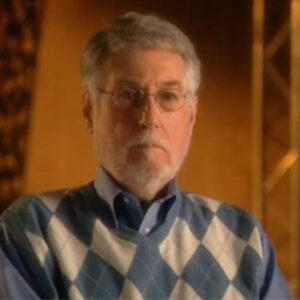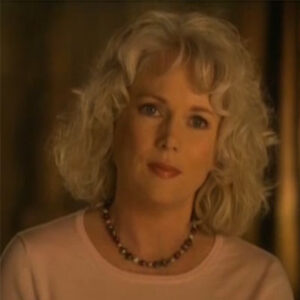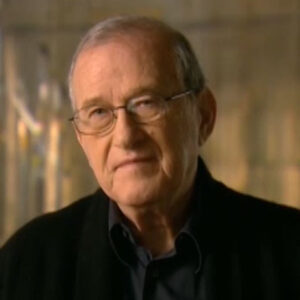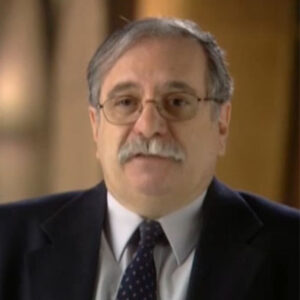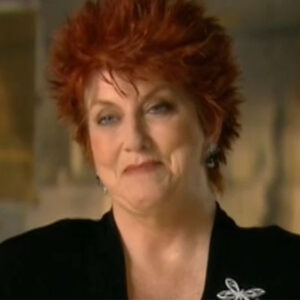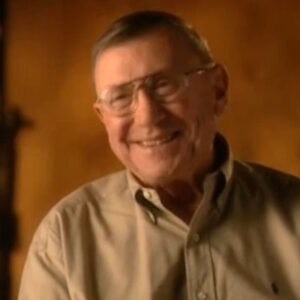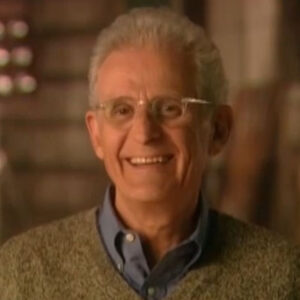Michael Zinberg: In between the two shows and we I actually made some pretty good some pretty good shows in the third series as well.
Interviewer: Back it up and start from the very beginning. I’m just curious if you can tell me a little bit about what you knew of Bob’s work before the show in terms of being familiar with his comedy.
Michael Zinberg: Well. I think Bob Newhart. Was one of the primary comedic voices of the 60s and and one of the voices that was most heard because of his because of the type of material that he did, it was material that everybody could listen to and everybody could identify with. You know, in in the comics of that day, whether it was, you know, Charlie Man or Shelley Berman or Lenny Bruce or any of those guys, they each had their own little niche. But Bob’s stuff was truly universal. So anybody who was interested in in in comedy or entertainment or watched The Sullivan Show knew who Bob Newhart was. And the button down mind. And, of course, that whole that whole buttoned down period. The transition from the 50s into the 60s. And and that whole cultural change. I mean, he was so much a part of that comedic voice.
Interviewer: So how could you compare him to some Berman and somebody? Was he more relatable?
Michael Zinberg: Well, I think I think that I think for one thing, he was he was less angry. He was universally well. His stuff was really funny and it didn’t make you uncomfortable. It was just great entertainment. And which is not to judge the other guys of that period. But but, you know, when Newhart came on again on The Sullivan Show or wherever you were lucky enough to see him, you know, here was this pleasant guy saying really funny things and everybody in the room was laughing. So I think that that really separated him from a lot of the other folks.
Interviewer: So you were like a college kid?
Michael Zinberg: I was a high school kid and then a college kid. And, you know, I was also an English major. So writing was always important to me. And to this day, I think that some of his set pieces are among the best written comedy around.
Interviewer: Do any favorites?
Michael Zinberg: Oh, I don’t know. I think, you know, Sir Walter Raleigh’s funny. And I think that, you know, the driving instructor of courses is a classic.
Interviewer: And why do you think they’re still on? I mean, it doesn’t.
Michael Zinberg: Well, it’s not dated at all. It’s it’s as I said before, it’s universal. It’s it’s stuff that we can all relate to. We’ve all taken driving lessons. We’ve all seen those people taking driving lessons. We’ve all been on airlines. We’ve all looked at certain things and and said, what the hell is that in there? And that’s what Bob does. Bob relates to the world as we do and speaks for us in a very funny way. Well, there’s there’s you know, in any comedy, there’s judgment. But but it is his judgment. The comedy that he puts out there is is stuff we feel so. So it’s not it’s not uncomfortable. It’s it’s very relatable.
Interviewer: So let’s talk about The Bob Newhart Show. And if you can tell me a little bit about the development of that show and how you became involved.
Michael Zinberg: Well. When I was very young and working at a company called Talent Associates, which did a lot of great shows, there was a bright young guy there named David Davis, and I was lucky enough to follow him around and learn a lot of things from him. And are you hearing that? That’s my phone. I apologize. Let me turn that off. Take them right in the middle of something, you ok?All right. And let me let me call you, run it through. OK. Love you. My son always take a call from my son. David Davis. David was an associate producer, he’d been a director, he’d been a script supervisor. He knew the business inside out. And when Talent Associates disbanded, he went off and became a part of The Mary Tyler Moore Show with Alan Burns and James L. Brooks and his then partner, Lorenzo Music. And I went off to work with another fabulous guy, Jim Garner, and. They wrote the pilot for The Bob Newhart Show. And got it produced and and sold. And as fate would have it shows come and go, I. I was lucky enough to come back to David. He invited me back to work on Bob’s show and The Mary Tyler Moore Show at the same time. It was the third and fourth season of The Mary Tyler Moore Show and the first and second season of The Bob Newhart Show. And David Lorenzo, along with in that first season, Billy Eidelson and a lot of other really good writers started to form what became the Bob Newhart Show and created those characters and just did a terrific job on the second season. Billy Eidelson went away and another good writer, Marty Cohen, came in. And it was Davian, Lorenzo and Marty, primarily in the in the in that season and then and then Marty left and David Lorenzo went off to do another show. And Tom Patchin and Jay Tarsus and I kind of took over the show in the third, fourth and fifth seasons. And then Tom and Jay left and then lessoned Glen Charles came in. And in the sixth season we did that show together. So I was I was lucky enough to be the only guy who was there for the whole six years. And it was really quite an experience. You know, you you you get something that early in your career and the only fear is it will never be that good again.
Interviewer: Well, what did you know coming into you? You came in after the pilot.
Michael Zinberg: I came after the pilot, right? I’d seen the pilot. David showed me the pilot. I’d seen the pilot and was quite good. Was a little bit different from the way the show evolved. Jerry, the Peter Bonners character was another psychologist. They made him a dentist. Billy Daley, who had done his own pilot that season, was not in the original show was Susie and Bob. And then and then Carol came along. You know, Marcia Wallace. And in the first episode that actually went on the air was a show about the Fear Flying Workshop with Bob in his group. Bob discovers it that Susie that Emily has this fear flying. And it was it was a wonderful, wonderful show and and a great way to to launch the series.
Interviewer: What have you heard about why changes were made since the pilot?
Michael Zinberg: Oh, I don’t think you really, you know, changes get made and things all the time. It was nothing unusual. It was just it was just an effort to look at something that they had done and make it better.
Interviewer: Do you think any part of it was I mean, you know, Bob is such an amazing reactor. Was there any part of that was about giving him more?
Michael Zinberg: Well, I think the David Lorenzo created the character Dr. Hartley, as psychologists so that he could react and and so that that he could have these people come into his office and and help them. And he could react as we the audience would react. I think the network at the time probably felt that two psychologists in a in an office was a touch too much. So they made Jerry a dentist. You know, it was the same same wonderful logic that would not allow Mary Tyler Moore to be divorced. They wanted her to be just a single woman. But that was the period, you know, was the early 70s. And although the network, the CBS network was adventurous in some ways, don’t forget that they also, in the early days of all in the family, ran that show with the disclaimer at the beginning of it. So, you know, they were they were looking to, you know, be a little bit more middle of the road maybe. But I don’t think the pilot was quite good. It was funny. Bob was Bob Suzanne with Suzanne. And I think those are the elements that were important.
Interviewer: So it was basing a show psychologist, considered a little bit, you know, a little bit progressive.
Michael Zinberg: Oh, I think so. Yeah. I mean, it sounds benign these days, but I think that, you know, the network was a little gun shy about dealing with crazy people, which, of course, was not what we were doing. It was just everyday phobias and and anxieties that we all have. I don’t know if you’ve seen this particular episode, but we did an episode with Howard Hasman where he he he came out of the closet. He declared that he was gay. And that episode was quite controversial and really took some courage on the part of Bob and the producers and Grant Tinker, who ran MTM to make that show. And. And we had quite a quite a tussle with program practices over that. So in its own way, the show was groundbreaking, albeit not as outfront is a you know, some of the other shows at the time of the family, for instance.
Interviewer: Do you think because it was a little more maybe subtle in its humor, sort of like Bob could get away with doing show?
Michael Zinberg: Well, I also think that it was more about taste. I mean, the way in which we did it when when the show was complete, they actually the network actually said we should not produce the show. And Grant Bob stood up and said that we’re going to absolutely produce the show. And then the network said, well, we’re not going to air it. And when it was finished, we ran the show for several gay organizations at the time to get their feedback. And the truth is that they loved it. And once the network got that kind of feedback, they were willing to run it. And, you know, went on the air and I think people enjoyed it. And the phone lines didn’t light up. The building didn’t fall down. It was, you know, just another another episode. And Howard Hasman was wonderful in it. As was Bob.
Interviewer: We would otherwise ground breaking the relationship between Bob and Emily.
Michael Zinberg: Well, I think that I think that the the Bob and Emily relationship, again, subtle ways, they did not have children. There were two adults living together and, you know, in love with each other, dealing with their own lives. But but not having not having three bouncy little kids running in and out of the apartment. That’s the way they wanted to do the shots away. Davian, Lorenzo and Bob and Susie wanted to do shown that was fine with everybody. So in its own way, you know, it wasn’t father knows best. It was it was Bob and Suzanne having fun and.
Interviewer: Didn’t Bob insisist on that in the beginning?
Michael Zinberg: Yes.
Interviewer: Can you talk about that?
Michael Zinberg: Well, I wasn’t part of the original conversations, but I know that any time that that subject came up, he and Suzanne both were were just said, that’s not our show. They they were two mature adults who wanted to do a show about two mature adults. Pretty much end of the conversation.
Interviewer: But weren’t there times I actually was surprised when you watched so many episodes that bothered me pretty clear from the beginning. There were episodes that seemed to toy with.
Michael Zinberg: Yes, there were. There was there was an adoption episode and there was some other other conversations about it. But it just it just wasn’t necessary. These people were so funny. By themselves. That you didn’t need to go to kids to have funny things happen in the show. You know, we had we had the groups, we had the patients. We had our characters. You know, Billy Daley. Well, you never knew what was going to happen when Billy walked through the door. I mean I mean, he was just he was just funny, funny, funny. And so sorry about this phone. Turn this damn thing off. Billy was just. Hysterical and Peter was wonderful and Marcia Wallace, rock solid. You know, whenever you needed, you needed to go someplace for a jog or a look or a set piece. When Marcia Wallace came through the door and just delivered big time.
Interviewer: Why do you think for him it was right not to have kids? Do you know what it was about? You seem to just be very clear about that.
Michael Zinberg: I don’t think it was anything more than a choice. I think that I think the Bob Newhart. Is it one of the great observational comics of our time? And and I think that he felt very comfortable with that and and didn’t need anything else.
Interviewer: Wasn’t there an episode, though, that. If you can tell me about it there. Where are they? I think it’s called you’re having my Hartly where you think all that bottom Emily is pregnant and then at the end was rewritten, I believe, for the end. Is that right?
Michael Zinberg: No. To be perfectly honest with you, I remember I remember the the the title, but I don’t think I can shed any light on that one. It’s interesting. What season was that? Do you remember?
Interviewer: I dont. It was.
Michael Zinberg: No. Wow, that’s interesting. I don’t remember much about that episode at all. I definitely remember the title, but I don’t remember the second chance. I, I, I. I don’t recall. Much. I don’t recall it, this was any big deal. I don’t recall that that any of the producers were strong in terms of why we have to have kids. And I know that I know that Bob and Suzanne. Felt like the show didn’t need it. And they were right.
Interviewer: What about the way that the show looked at, again, their relationship or the tone of the show that it wasn’t? I mean, you had all in the family, which was much more sort of, you know, topical and pushing the envelope that way. But it seems like if you could talk about The Bob Newhart Show, sort of push the envelope on the relationship side.
Michael Zinberg: Well. You know, I don’t think that. I don’t think that it was our show to be political. The. The relationship between Bob and Suzanne was about two people who love and supported each other and and who who dealt with each other and and their little ins and outs in mature ways. And that was the show. You know, it was it was Bob at the center of a world that was just slightly off kilter, you know, was one or two degrees one way or any other. And and and his ability to deal with it and cope with it and and understand it was the show. I’m not sure that we ever made a political statement in six years. I know we did one show about about a business manager. And it wasn’t particularly funny because it wasn’t our show. And and we never did that again.
Interviewer: Do you think it was groundbreaking in that way.
Michael Zinberg: Well. Given the show and its lineup on Saturday night, you know, Mary show was certainly groundbreaking in terms of as of a single woman making it on her own. You had MASH, who is looking askance at at various establishments, and Archie Bunker, who was Archie Bunker, have to have to clarify that. Bob’s show was an anchor. At the end of those three shows, you could come back to Bob, show and see something that was hopefully relatable, topics that were understandable and and dealt with in a very mature and funny way. Is that groundbreaking? I don’t know. I know that that the show absolutely holds up. I mean, we’re talking many, many years down the line and many cycles of, you know, reruns. And I know that when people look at it today, they can sit down. It doesn’t feel dated. Maybe there’s a code or two that doesn’t quite fit in GQ. But the show is not dated. It’s topics are relatable. They’re they’re the anxieties and the stresses that those people felt in those show. In the show then. That same stuff we deal with today, you know, trying to carve out a life.
Interviewer: What about the fact that Bob and Emily were clearly, you know, sexually active and that there was a lot of humor around their sex life and seeing them in bed and talk about. I know they weren’t perhaps the first couple ever to share a bed on TV, but they were certainly one of the first.
Michael Zinberg: Very much. I mean, you know, we we. I mean, there wasn’t a love scene in The Bob Newhart Show, but. But there were a lot of scenes where they were clearly affectionate towards each other. And those bedroom scenes were some of the funniest we ever did. The stuff that they. In timing. Oh, my God. The timing with Bobby and to both Bob and Suzanne. Turning on the lights, turning off the lights, the afterthoughts. Just when you thought the scene was over, bam, on would come the lights. Another. Another great moment. That was, again, kind of a look at at the way people actually relate. You know, I mean, we all have great conversations in our bedroom, in bed, among other things. But that was part of life.
Interviewer: Do you remember being aware that this was again?
Michael Zinberg: Not really. It was a big double bed. They were always clothed. There wasn’t anything. You know, I think wink wink about it. It was just it was just a good arena for two people to be sitting there talking to each other. I think that was pretty much it. We never felt like, oh, well, let’s put him in bed and we’re really going to tear this one up. No scenes were ever written with that in mind. The shows were written with strong narrative, trying to be as true to the characters as we could be and as funny as we could be.
Interviewer: Was there anything about that really funny to.
Michael Zinberg: No. Not that I can think of. Bombs funny anywhere. I mean, Bob Newhart is funny on the phone. You know, as benign places, you can get a man sitting at a desk on the phone and he can just kill you.
Interviewer: Was there a conscious effort? I noticed that. And.
Michael Zinberg: Yes, there was I was all I was always a an effort to to put him on the phone because so many of his wonderful set pieces were were phone calls. There was always an effort to put him on the phone in some way or another. And and you’ll notice that that there was never anything filmed. On the other side of the phone. It was it was, you know, every other show you intercut between people, but with Bob, you stay on pop. And that was you got everything you needed after that phone call by just staying on, Bob. That in that way, it’s truly unique.
Interviewer: What about the fact that he was a stand up comic?
Michael Zinberg: Right.
Interviewer: Coming into he had never done. I mean, he had his variety show, but he had never done a series, a sitcom. And if you can talk about that. I don’t know if how you seem to get to have a learning curve if you seem nervous or just talk about that.
Michael Zinberg: I don’t know if there was a learning curve. I doubt it. You know, because so much of what Bob does is timing and his timing is flawless. I don’t know how much experience he had on sets before he came in to do that show. I know that that he had terrific support. You know, everybody that worked on the show all through the years was was top quality. The directors were terrific. The writers were as good as we could get. The sets always looked great. Camera people were wonderful. It was a great group of people all the way through. Bob is a deceptively good actor. In a separate acting from standup, because they’re two very different skills. But but his his timing and his talent lend itself to acting as well as to being in front of a large audience. He’s awfully good. And and there are hours and hours and hours of television to prove it. But the dramatic stuff he did, the turn he did on E.R., for instance, he’s off the page. And and I think that in the early days of the show, he probably didn’t get the credit that he deserved as an actor because everybody thought, oh, he’s so funny. It’s just it’s just so easy. But in our show, there were moments when when he really, really just it was pure acting. It was wonderful. And and I would love at some point if somehow while he was out, he was nominated for that E.R.. He got an Emmy nomination. But he’s terrific actor and always was.
Interviewer: What about the Emmys? Talk about your first show.
Michael Zinberg: Well, we always thought we were the, you know, the tail on the dog a little bit. We were nominated for show a couple of times. Bob was never nominated as an actor, which I thought was silly on the show because of its time period. Didn’t really get the recognition within the community that I thought it deserved. And I think that, you know, it might sound self-serving as a as a part of the group that made the show. But the proof of that is how well the show is syndicated. I mean, you know, everybody that watches it now. They just. Wow, that’s such a great show. That’s such a great show. And and because my passion and all my family and Mary Tyler Moore and Carol Burnett were such high profile shows and deservedly shot and deservedly so. I felt like they overlooked us from time to time.
Interviewer: You think the show was too subtle?
Michael Zinberg: My I just think it was, you know, the good news and the bad news about the time period. You know, I people laughed at the show, they loved the show. Everybody you talked to said, oh, the Bob Newhart Show. That’s one of the funniest shows ever. But I just think because there’s just so many nominations and so much hoopla that shows get, you know, you’re you’re you’re suffering from being associated with such fine company.
Interviewer: You were talking about, you know, about stopping a good actor as well as being so good in front of an audience, right. Wonder if you can talk about. I understood that he insisted from the beginning that.
Michael Zinberg: Oh, sure. But I don’t. I don’t think anybody was finding him on that. I mean I mean, Davian Lorenzo. Were were multicamera guys. MTM was a multi camera shop. We did our shows on film as as opposed to the Norman Lear shows which were done on tape. We like the look of film in those days better. We thought it was more flattering for our actors. And it was. I’m not sure it was ever a question, you know, about whether is whether we should go to tape or not. It was three and four camera film.
Interviewer: If you can explain the difference that one would be. That one would have the live audience.
Michael Zinberg: We’ll both head live audiences.
Interviewer: OK? What was what I thought, though, that he insisted not all shows did just use the live audience laughter Is that right? And I think he’s talked about how that was really important to him.
Michael Zinberg: Well. All of it, whether you did the show on tape or on film, you know, they had a live audience, Nauman shows all had a live audience. There were some shows that that that overused the laugh track. I, um. I don’t know which shows those would be, but I know some that Bob Ann and David. And as a result of David’s insistence, my insistence, because he he was my mentor in this area and the post-production area. They demanded that that the laughs be real. And that when when wherever we did use a laugh track, that it had to be of our own audience. Now, there was a guy in those days named John Pratt, who was a genius. And he was the fella who used the laugh machine. And you needed the laugh machine for addicts and Fabians fade outs. Those kinds of things. You know, when when a bump was created in the editorial post-process process, you needed the laugh machine. And and and Johnny was very artful in in doing exactly the right laugh in exactly the right place. But ninety nine percent of the laughs that were in our show were from the audience. And. David would always watch the show, as would I. And if, for some reason, a clan laugh went through the went through the track. Believe me, my phone would ring. Would you turn it off? It never stops buzzing. David Davis is a giant. I mean, he’s just a giant. When you when you when you see his credits, I mean, Newhart rode a taxi. I mean, you know. He’s he’s quite a guy.
Interviewer: If you could talk about you wrote and wrote and directed. You just talk a little bit about your experience, what it’s like to write.
Michael Zinberg: Well, I mean, the truth is that my main responsibility was. Were were producing the show. And in that that was from beginning to end. The MTM company at that time. Was a virtual sea of wonderful writers. I mean, the list is endless. And and truthfully, I was not as good as some of them. I had a great time. I love being in the room, but writing from scratch was probably not one of my favorite things. So Grant, Tinker and and Bob suggested that I direct the show and and because I had directed actually for any team and PBS prior and I loved directing and that was that was a great thing. And and that became a primary responsibility in in the fourth, fifth, sixth and six seasons of the show. So. Writing for the show was very hard. No matter who was doing. Because Bob is a very good writer. And and he proved it over and over and over again. He not only wrote great stuff, but he knew good stuff from great stuff. So we were always trying to give him material that he felt comfortable with and that he would be proud of. And and that was a terrific responsibility that that all of the writers felt and and tried to live up to. Directing the show was really fun because they were good, because they were good actors, because they were easy to work with and because the shows were fun, they were clever. And, you know, you say, well, guy, you put one guy in a chair and another guy on a sofa opposite him. How hard could it be? There’s truth to that. Part of directing The Bob Newhart Show was to get out of their way, because whether it was Tom Poston or Jack Riley or Howard Hasman or any of the other guests that came through, and certainly with Bob and Susie, they knew what they were doing. So you tried to make them comfortable. You tried to get the cameras to be as economical as possible and off you went.
Interviewer: When you talk about the writing being a challenge, how would he make his opinions known? How would you know?
Michael Zinberg: Oh, you could tell. I mean I mean, you know, in the run through is if a joke worked or didn’t work, if if a joke was if a scene was good and the jokes were good, you know it. If the if the you didn’t need anybody telling you, if it wasn’t working once in a while they’d be a joke that Bob didn’t think was up to standards. And he’d, he’d give you a look during a scene or something like that. But, you know, you could you could tell I mean, that was the job. The job was to be able to tell what was working and what wasn’t working. And and the only thing that that that Bob ever. Felt the only time Bob ever asserted himself was when he felt that the writers were getting too possessive of a piece of material or a joke. When when he felt something wasn’t really working and it came back in the next draft and it was still there, you know, he would express his opinion. But in in a very, very gentle and an adult way. And, boy, you had to listen. And if you didn’t, it was not too smart. Not not because Bob would do anything, but just. Why not listen to somebody that good?
Interviewer: Talk about it, since you two people who was there through the whole thing. Towards the end. There was a point, wasn’t there? Can you explain for us? When Bob wanted to and I think even earlier than he did. And what what what happened with that and what changed his mind and when that was?
Michael Zinberg: Well, that’s a that’s a question for the business, guys. I’m not sure I knew much about that, but but I did know that. That. You know, when you come in every day and, you know, Bob had young kids and he had a huge life outside of the show, he had a huge career outside of the show, playing the clubs in Vegas and everything like that. You come in week after week, in and in every scene you have, every other line. It’s a lot of work and it’s very demanding. And one of the things that Bob asked for in the last season of the show was that if there could be a group of shows, not many in which he might not be so heavy in the way in which we accommodated him with that was is that we wrote some shows in which Suzanne was taking lead. And and we shot Bob’s scenes on weeks when Bob was present. I think it was only three or four shows is all. And then we added them into the show so that Bob’s presence would be there. And it went fine. And that way he got a little bit of a break. And it was, you know, if you’re not paying real close attention, you can’t tell the difference.
Interviewer: Wasn’t there, though, at the end of season five, the five, that that might be the end and some writers left and so forth. And you talk about.
Michael Zinberg: Well. I know that at the end of season five that the Tom Patch and Jay Tarsiers who are who are terrific riders who left the show and I think that, you know. They were just toast. You know, you do a show. They were on the show virtually from the beginning. They were story editors. The second season and then. And then. And I think they wrote a couple of episodes in the first season.
Interviewer: So it wasnt Bob saying.
Michael Zinberg: I’m not aware of any of that. I think they were just ready to go. You know, they went off to do their own things. And and I know that that. I really felt strongly that that that the Charles brothers could come in and do a terrific job and. You know, I got I like to say I was right about that.
Interviewer: Talk about the end of the series, Bob’s decision.
Michael Zinberg: Well, you know, six years. It was a it was a great run. And the show had had matured and new characters had come. Tom Poston came in and did five or six great shows. I guess we just felt like it was done. And although the last episode was very sad and Peter Bonners and I directed that together. I I’m not sure there was. I think people thought that that was a pretty good run. And we’re grateful for it. I’m not sure anybody had any other feelings about it other than well, onto new things. And I’m not I’m not real familiar with what Bob’s thought process was in terms of bringing him back, but we’re sure glad he did.
Interviewer: Can you talk about shooting that last episode, I know how it seemed, and he’s not emotional particularly, but.
Michael Zinberg: Well, I think that of everybody, I think all of us were. I think all of us were. Aware that that we had done something special, that we were lucky enough to be a part of something special and that that, like all good things, that it was going to end. I know that after the wrap party, I went back to watch him tear down the sets, which was kind of an interesting moment for me. And we all.
Interviewer: You can hear the car backing up out. You say that you went down to the set. being torn down.
Michael Zinberg: No, I just slipped away from the party. I’m just you know, it, as I said, when when something that good happens to somebody early in their career, you know, it was a family. I mean, we knew each other really well. More often than not, after the show, we would all go have dinner together at one of the local restaurants. And, you know. A lot of us had kids during the show, we we we we knew each other really well and and I had enormous affection and respect for that cast and for Bob and Suzanne in particular and. It was you know, it was a moment. It really was a moment. And that stage has been good luck for a lot of people. You know, White Shadow went out and after that and Bob went back in there. And I think Will and Grace are in there now, that that stage has had some some really good shows.
Interviewer: Did Bob do anything sentimental like that?
Michael Zinberg: No. Not that I’m aware of. I know that he he was very gracious and and, you know, said some lovely, inappropriate things that both the final shooting in the end of the party and, you know, it was all handled with a great deal of class.
Interviewer: And what did he go off to do after that?
Michael Zinberg: Well, as far as I know, I think he made a move here, too, and and I know he played a lot of the clubs and then a couple of years later, he decided, I think I if if I. And this is totally an educated guess, but I think the road got him as it gets us all. You know, I think I think we all get tired of being on the road and we want to work at home. It’s happened to me two or three times in my career where I just realized, my God, I’ve been on the road four months and I want to. I want to shoot something in Los Angeles. So I think that that was part of it. His kids were growing up, you know. And I think he wanted to be around for that. And I think you he also realized that it was was a lot of fun, you know,.
Interviewer: That was part of his decision to.
Michael Zinberg: To come back. Yeah.
Interviewer: I’m sorry. Can you say that.
Michael Zinberg: Oh, I just think it was part of his decision to return to multicamera comedy. Plus, he was such a star. I mean, God. Yeah. Bob Newhart Show. Who doesn’t wanna watch it?
Interviewer: Talk about the rarity in your business. Obviously, you know how rare it is for somebody to have to. To think serious?
Michael Zinberg: Well, I think it’s extraordinary and I think it speaks to, you know, his popularity and his is longevity and his ability for audiences to relate and like him. I mean, there’s not many people who have had two big hit shows. And, of course, Bob had a couple of others that that were almost successful. Very good. The show he did at Paramount was a was a very nice show with the Kaleen and in that cast didn’t land, but didn’t mean it wasn’t a good show. You know, I can think of only one or two other people, Jim Garner among them, who’ve had multiple hits shows.
Interviewer: What do you think that points to about Bob?
Michael Zinberg: I think it points to the fact that people just like him. And that he’s just so good at what he does. He’s just, you know, he’s like a guy you want your living room. You know, you feel like he could sit down and have dinner with Bob Newhart, you know? And he’d make you laugh and feel good.
Interviewer: Can you talk about those two shows, anything similar points to what works?
Michael Zinberg: I think so. I mean I mean, they were different in a lot of ways, obviously. But but I think both were arenas in which Bob could observe. And that the world would come to him and he could react to it. And whether it was Mr. Carlin or Larry, Darryl and Darryl, you know, or Posten walking in the front door and both shows, you know, you couldn’t wait to see what they were going to bring and to see how Bob would react.
Interviewer: Could he make something funny or just, by the way, make a line funnier just from his reaction from saying nothing?
Michael Zinberg: Well, I think that I think that, you know, you mentioned Jack Benny a minute ago, I think. I think that when when when I think of great comedic reactors, three names come to mind. Jack Benny, Johnny Carson and Bob Newhart.
Interviewer: And just blinking.
Michael Zinberg: Timing. He’s just got flawless timing. I mean, they just he just. He can make anything funny.
Interviewer: And what about the finale for Newhart a little bit about the the the waking up with Susan and Ben having it be a dream thing?
Michael Zinberg: You know, I’m not sure whose idea whether it was I haven’t I. Somebody said it was Susanne’s. And I’m and I’m really not sure you’d have to ask Barry Kamper probably, Bob, but it was hysterical and. And one of the great moments in television, I mean, it really was it was it was tying the two great series together and in a classy moment. And, you know, you just laugh thinking about it, bam, the light goes on. Bob’s like, I had this dream.
Interviewer: He says it was wife’s idea.
Michael Zinberg: Quite possibly was Ginny’s idea. I mean, if he says it, I’m sure that’s true. She’s so very clever and and wonderfully supportive woman. She was. She was always fun to be around. She was always great to have around. And, yeah, she had a lot of ideas. She’s a show business girl. Her father was a terrific actor. So she knows what she’s talking about.
Interviewer: Talk about the two later series that he did after that. If you can just explain a little bit what they were like.
Michael Zinberg: I don’t know much about George and Leo. I know that it was a well-intentioned show, as they all are. Nobody starts out to make a bad show. Nobody sits down and say, let’s do a really crummy television show. But I don’t know much about that show. I know that that I felt that in watching it that it wasn’t the best use of either Bob or Judd Hirsch. But that’s just a personal opinion. Well, I just I just felt like their characters were. We’re not we’re not clearly defined, you know. And and as a result, I think the show kind of just didn’t have a real foundation in the in the in the show that that we did where Bob was a cartoonist. I felt like that the show couldn’t decide what it wanted to be. Did it want to be a domestic comedy or did it want to be a comedy about a comic strip? And and as a result, again, the characters were not clearly defined and the audience just said, I don’t think so. Doesn’t mean everybody didn’t try really hard. And it doesn’t mean we didn’t do some really, really funny shows. I mean, I can remember three or four episodes in particular that were really funny, but. But it it felt. It felt too jokey. The reason that the first two shows were successful was that the jokes came out of character. And I think that if there is a reason and in there quite possibly isn’t one that the others. The other two shows didn’t work. But if there is a reason I felt like the jokes were jokey and did not come out of the characters.
Interviewer: Did Bob seem frustrated by the experience?
Michael Zinberg: Well, I only did the first year of the of the Bob series and and he worked hard. He really worked hard. I think he was a little frustrated that there wasn’t that there was there were too many jokes and not enough character. But, you know, I know he he gave it everything he he had. And I was not connected at all with the George Anthony of show. So, listen, none of us like to do stuff that doesn’t work and we’ve all done it. But I would I would I can’t imagine Bob Newhart not going into something and committing a hundred percent.
Interviewer: Actually, I was talking with his wife yesterday and she said that, you know, people wouldn’t know that this but that how much he sort of, you know, agonized over every show wanting it to be just right.
Michael Zinberg: Absolutely. I mean, Bob Newhart works hard. He does. He always did. I mean, he you know, whether it’s it’s a it’s a group that he’s going out to do and an hour and a half or an in some club or in a theater or whether it’s a show. I mean, you can see it. He works hard. You know, the stuff he’s done in features and in the in the stuff he’s done on television. It’s it’s not easy. He makes it look natural. He makes it look like, oh, he’s just you know, it’s snap of the fingers, but it’s not. It’s you know, I’d like to have a dollar for every line he’s memorized in his life. We’d all retire.
Interviewer: Why do you think you work so well on television? I mean, he’s had he’s done futures as well. But obviously that seems.
Michael Zinberg: Well, I think that I think that one of the reasons he works so well on television is because he has a very expressive face. He just he just can project so much with a look and a beat and a blink. And, you know, and it’s wonderful watching him wind up to a joke, you know. You know, you just you know, it’s coming. You know, it’s coming. And then he gives it to you. And it’s terrific. So I think that that the television is is is good for him in that respect. Although the stuff he did an elf was hysterical. You know, I think he works both places, but television close up, Bob is really, really funny. On the other hand, you know, in a club where he’s standing on a stage far and far away, you know, the guys in the back are laughing just as hard as the guys in the front. So. I don’t know. Yeah. Really? Exactly.
Interviewer: What do you see as this legacy in terms of. How he’s impacted the field of comedy or.
Michael Zinberg: Well, I know that he was awarded the Mark Twain Award and and I think the legacies will be similar. Mark Twain was was and is seen as one of the great American humorists. And I think Bob will be seen in the same light and is seen in the same light. I mean, he’s his his span of years, the body of work, starting with the records and ending with the stuff that he’s doing now and the stuff that he’ll do in the future. It’s an amazing body of work.
Interviewer: I just want to check a couple last. The death or the near brush with death. Right. So I’ll ask about that and then we start again. I had told me this, that there was a story about someone, another director, who at one point had asked him to run his lines tighter and didn’t quite get his. Do you remember that that happening or that incident? I got to see. Without mentioning any names.
Michael Zinberg: That’s a bad idea, too. That’s a bad idea to tell Bob Newhart to how to do his lines. I do.
Interviewer: Whether that will be a couple of episodes, look. So if you could tell that story, what you know about that particular story.
Michael Zinberg: Well. Whenever you direct Bob, as I said earlier, the best way to direct Bob is to let him be Bob and and the the idea of of telling Bob to change his. Approach or to say something faster or to do it this way is silly. I mean, you you his timing is absolutely flawless. And and one thing, you know, as a director, are you one thing you should know as a director is when you see something. That’s right. Don’t try and screw it up.
Interviewer: Do you recall that incident. Can you tell me what happened?
Michael Zinberg: You know. One of the worst things you can say to a actor is louder, faster and. And I think in in this particular case, somebody said that to Bob and. As gently as we could, we said that that wasn’t the best way to handle our actors, but it was a very rare occurrence.
Interviewer: We didn’t see too much of that person, perhaps after that. You can talk about your a couple of episodes. We talked about one of your favorites being the ventriloquist.
Michael Zinberg: Well, the the. One of the great moments in the show, whether whether in any show, whether it was a show about something that was happening at home or something was happening that was happening in the office was the the the pieces that we did with Bob and his his patients. And in this particular episode, Bob was Bob was treating a ventriloquist and just interviewing ventriloquists alone and trying to find the right person for the show was pretty hysterical. Guys coming in with, you know, radios going on in their cases so that their little figures wouldn’t be alone. And it’s a it’s a it’s a wonderful and unique breed ventriloquists. But we finally cast a bright young guy who had a figure who looked exactly like him, a miniature version of him, bushy eyebrows, glasses, the whole thing. And and the whole thrust of it was, as Newhart said. He said he said, well, it’s always good to start a relationship with a with a new client. Can you tell me what the problem is? And there was a two shot and wonderful two shot of the ventriloquist in his lookalike dummy. And the ventriloquist nods the dummy and says to Bob he wants to break up the act. Cut the new heart. And just wait for the laugh to go on and on and on and on. And there are several more very good jokes about them. And then. We cut outside and carols at her desk typing and Bob walks out by himself and just stands there. Carol’s looking at him and she says, Bob, aren’t you? Aren’t you with a client? And Bob says, as he always did so perfectly. They they wanted to talk among themselves. And again, it’s just it’s it was a great, great moment. The group moments, whether it was Carlin or Prager or. God, Florida freebies, any of them, there were there were wonderful, wonderful moments. And yet another favorite episode, Death Be My Destiny, was was a great episode where where Bob is on top of the world and feeling everything is going his way. And he walks to the elevator while he’s talking to Carol, the elevator doors open, the elevator is not there. And he barely grabs onto the cables. And we leave him there with with a brush brush with death. And then for then for the entire next episode, everything is is going to gone. That’s going to be the end of it. He’s he’s you know, every there’s there’s more there’s an omen after omen. After omen. And one one very funny moment when when Tom patch it. Actually one of the one of the executive producers at the time, Bob, is talking about, you know, it’s there are signals everywhere. There’s and the elevator doors open. And and Tom Patchett is standing there in a long black suit with a black hat and looks at him and says, Going my way. The doors close. But but the funniest was one of those great scenes in bed where where Bob and Suzanne are talking about. About, you know, all these things that have happened. And he keeps talking and talking about hearing Blackbird’s and seeing Johnny Cash in. And the look on Suzanne’s face was just fabulous. Just, Bob, your you need to talk to yourself. That was a it was a really terrific episode. Death be my destiny.
Interviewer: Seconds. Michael Tone. Fifteen seconds. And Tone Michael interview.

